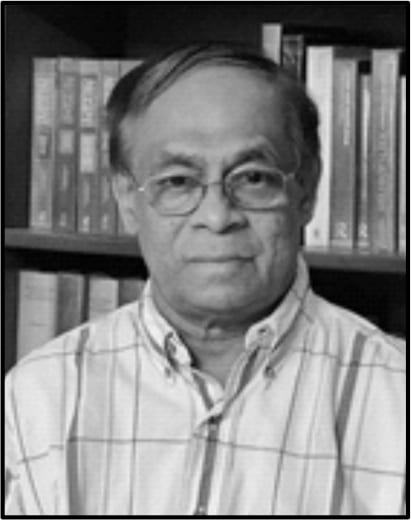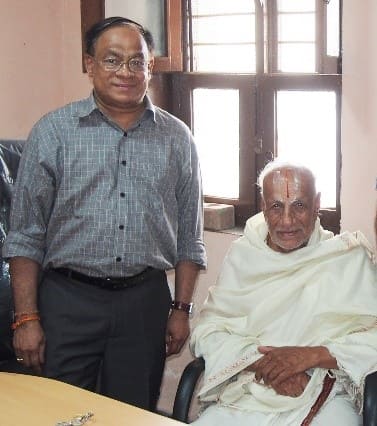My interactions with Prof M.A. Lakshmithathachar
In the year 2014, I and a colleague of mine were trying to do some work (by way of offering our services) for the revival of the ancient intellectual tradition of this country. We were convinced that the only way to resuscitate our ancient vidyas in today's world was to dismantle the Western ideas and theories that stood in opposition to the Vedic tradition through the critical methods and tools of Nyaya shastra. Towards this end, I and my colleague had been meeting various traditional Sanskrit scholars of this country trying to convince them that they should come together for the purpose of reviving the tradition of tarka. In October of that year, we made a presentation on this theme at a Round Table Conference held in Hyderabad. In all these interactions, the response we got from the scholars was quite typical: everyone seemed to agree that the idea was interesting but almost nobody showed enthusiasm for actually taking the idea forward. One could sense that there was a general feeling around that it was not feasible in today's world to revive the tradition of tarka.
It was against this backdrop that I received, a few weeks after the conclusion of the Round Table Conference, a mail from Samskriti Foundation informing me that a Workshop on the theme of Reviving the Indian Intellectual Tradition was being arranged in Mysore and inviting me to be the chief guest for the event and to deliver the keynote address. The mail left me flabbergasted! For here I was, an ordinary person with no formal training in either Sanskrit or the traditional vidyas, being invited to give a keynote address to an august gathering of scholars. The prospect seemed almost unbelievable - but I came to know that this was the way Prof M.A. Lakshmithathachar functioned. Despite his high stature as a great Sanskrit scholar, despite his hallowed position as an acharya in the direct lineage of Sri Ramanujacharya, despite his high standing among the renowned scholars of the country, his heart was large enough to give space even to an ordinary person like me when it came to pursuing a noble idea. And this is the characteristic trait that I have seen in all my interactions with Prof Lakshmithathachar-ji – it was not just his scholarship that was vast and extensive, it was also his heart that was as expansive and large as the infinite sky.
The Workshop was held in Jan 2015. And much to my immense surprise and astonishment, at the conclusion of the proceedings, Prof. Lakshmithathachar proposed the setting up of an Academy, in the form of a subsidiary of Samskriti Foundation, to provide a platform for our traditional scholars to come together for the specific purpose of reviving the Indian intellectual tradition; and he asked me and my colleague to take over the reins of the Academy. This was a dream come true. All along we had been finding it difficult even to get people to lend an ear to the idea but in the hands of Prof. Lakshmithathachar, the idea was not only taken up and discussed and debated but actually translated into action in a matter of days! The Academy, was named Gautama Academy of Indian Intellectual Traditions (GAIIT), and it was actively involved until the year 2020 in conducting various workshops and seminars in which many traditional scholars participated and had vibrant discussions on countering certain Western viewpoints and establishing the Vedic viewpoint.
One of the endearing qualities of Prof. Lakshmithathachar was his enthusiasm about every task or project that he took up. One of the projects we had conceived for GAIIT was to build an Encyclopedia with an inverted tree structure which would show how all the various vidyas of Sanathana Dharma were so many strands of one integral body of knowledge. At that time, we could not take up this project for execution due to our other activities. But when I visited Melkote in the year 2018, I was surprised to discover that Prof. Lakshmithathachar had almost single-handedly constructed the entire tree structure with every node in the tree having extensive references to Sanskrit texts. He spent the entire day explaining to me the features of the system which he had so painstakingly built. I couldn't help but be overawed by both by his enthusiasm and his overflowing energy even at his advanced age.
Even though Prof. Lakshmithathachar strictly followed the Vedic way of life, his adherence to the tradition was complemented by a broadness of vision which embraced both the traditional and the modern. He did not despise modern science like some conservationists did; instead he sought to build a synthesis between the ancient vidyas and modern science so that we would be enabled to live our lives in this world in a more wholesome and spiritually fulfilling way.
The last conversation I had with Prof. Lakshmithathachar remains vividly imprinted in my mind. We were discussing the topic of consciousness and the different ways in which the Western tradition and the Indian Vedic tradition look at consciousness – the former holding it to be a variable and to be absent when there are no objects in one's conscious awareness whereas the latter holds it to be invariable, eternal and infinite. In a brilliant exposition, Prof. Lakshmithathachar explained that both these views are valid and that they get synthesized in Vishishtadvaita. He explained that it was only in Vishishtadvaita that consciousness was considered as having two aspects, the one, the substratum of the universe, to be unchanging and eternal and the other, which we may call the 'functional aspect of consciousness', to be variable and subject to contraction and expansion. He explained that the purpose of seeking knowledge and performing sadhana is to attain an expansion of consciousness whereby it obtains a likeness to the Eternal Universal Consciousness. In Prof. Lakshmithathachar's presence, one couldn't help feeling that one was here confronting an unfathomable consciousness! I do consider myself extremely fortunate to have been associated with Prof. Lakshmithathachar and do hope that all the projects which he started so fondly will attain fruition.

